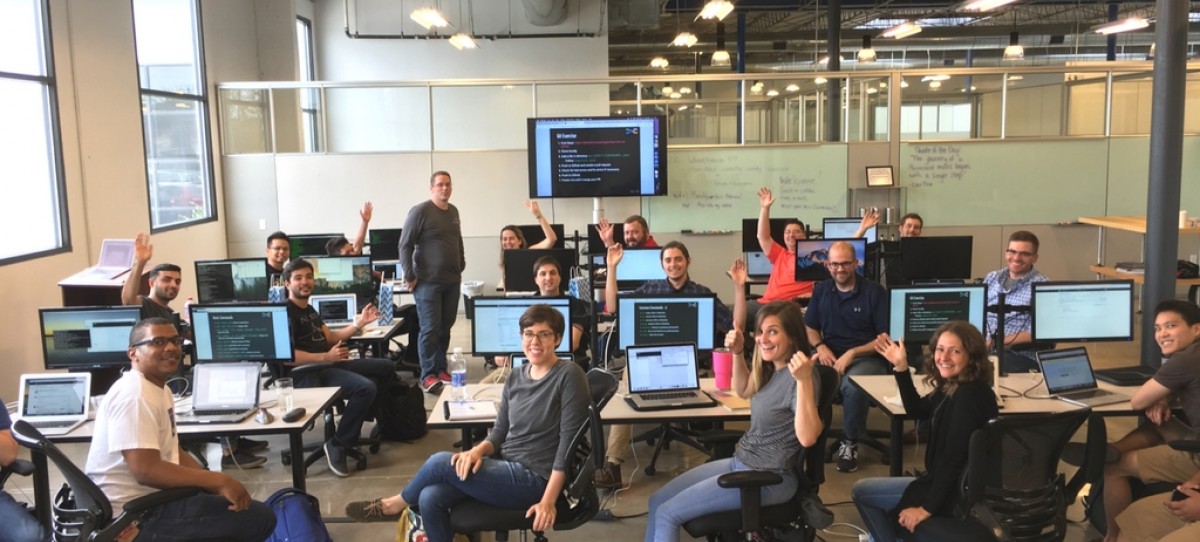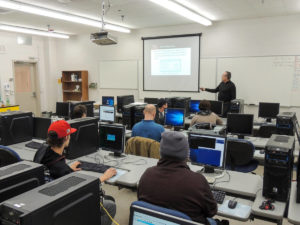
Coding Bootcamp Acquisitions: 2014 to 2022
This article provides an overview of the publicly announced tech and coding bootcamp acquisitions since 2014.
This article includes the following sections
- Introduction
- Understanding the Bootcamp Market
- Valuing Coding & Cybersecurity Bootcamps
- 2022 Bootcamp Acquisitions
- 2021 Bootcamp Acquisitions
- 2020 Bootcamp Acquisitions
- Summary of Tech Bootcamp Acquisitions
- Notable Coding & Cybersecurity Bootcamp Acquisitions
Introduction
Since the first coding bootcamp acquisition in June 2014, we’ve seen dozens of coding bootcamps get acquired by a wide range of companies, from for-profit education companies (like Capella Education) to co-working companies (like WeWork) and other coding bootcamps (like Thinkful + Bloc)!
With rapid market growth in the bootcamp industry, other types of for-profit education companies are taking note, including traditional vocational schools and 4-year colleges and universities.
Many of these coding bootcamp acquisitions should come as no surprise. Some have been very successful, with the programs going on to significantly increase the number of physical locations and online course offerings.
In addition, as coding bootcamps mature, we are beginning to see bootcamps get acquired by well-known companies for increasingly large sums. For example, General Assembly was acquired for $413 million, and Trilogy Education for $750 million!
As education industry specialists, Jackim Woods & Co maintains a list of bootcamps acquisitions to track who’s buying whom and how bootcamps and how edtech companies are valued. As we were compiling the 2022 transactions, it occurred to us that others might be interested in this information as well, so we thought we’d share it with you. We plan to update this list each year with publicly announced deals involving coding and cybersecurity bootcamps.
 Understanding the Coding Bootcamp Market
Understanding the Coding Bootcamp Market
If you are interested in learning more about the $2.3 billion tech bootcamp sector, please see our article Understanding the Tech Bootcamp Market.
Valuing Tech & Coding Bootcamps
If you’re interested in understanding how bootcamps are valued, please see our article How to Value a Bootcamp – Example and Multiples.
You might also enjoy reading our related article, How to Value an EdTech Company – Multiples & Example.
2022 Coding Bootcamp Acquisitions
2022 was a big year for tech boot camp dealmaking.
- 2022 started off with a bang when Skillsoft, an online course provider, acquired Codecademy in January for $525M.
- Then, in February, Centage Group acquired InfoSec, the leading provider of tech-related certification prep courses, for $190 million.
- The year also ended with two notable transactions when Digital Intelligence Systems acquired Grand Circus for an undisclosed amount, and Simplilearn (a Blackstone Group-backed company) acquired Fullstack Academy. Fullstack Academy was estimated to be valued at $55 million.
2021 Coding Bootcamp Acquisitions
- ThriveDX (HackerU) acquired Cybint for a reported $50 million.
- Brainstation acquired Wyncode in January 2021
- SNHU acquired Kenzie Academy in March 2021.
2020 Coding Bootcamp Acquisitions
- K12, the publicly traded online K-12 school and education management provider, paid $165 million in cash to buy Denver-based coding bootcamp Galvanize. For K12, the deal means adding more coding curricula for students in its Destinations Career Academies, which offers high school and career training program hybrids. For Galvanize—which is also Hack Reactor—the deal provides additional funding to grow its corporate learning business, add more physical locations, and increase its services to the military.
- K-12 acquired Tech Elevator for $24M
- Carrick Partners acquired Flatiron School from WeWork for an undisclosed amount.
Summary of Coding Bootcamp Acquisitions
The following is a summary of the publicly announced acquisitions of tech-related bootcamps since 2014. Keep in mind that only large transactions are typically announced to the public. We estimate that 75% of the bootcamp transactions each year are small and are not announced to the public.
| Date | Bootcamp | Buyer | Amount |
| Nov-2022 | Fullstack Academy | Simplilearn (Blackstone-backed) | Not Disclosed |
| Nov-2022 | Grand Circus | Digital Intelligence Systems | Not Disclosed |
| Aug-2022 | ChainShot | Alchemy | Not Disclosed |
| Jul-2022 | Holberton School | African Leadership Group (ALG) | Not Disclosed |
| Jun-2022 | Emil | Le Wagon | Not Disclosed |
| May-2022 | LUCY Security | ThriveDX | Not Disclosed |
| Mar-2022 | Kontra | ThriveDX | Not Disclosed |
| Feb-2022 | Infosec | Cengage Group | $190.8M |
| Oct-2021 | Pentester Academy | INE | Not Disclosed |
| Aug-2021 | Cybint | ThriveDX (HackerU) | $50 Million |
| Aug-2021 | DigitalCrafts | American InterContinental University System | Not Disclosed |
| Mar-2021 | Kenzie Academy | Southern New Hampshire University | Not Disclosed |
| Feb-2021 | Wyncode Academy | Brainstation | Not Disclosed |
| Nov-2020 | Tech Elevator | K12 (now Stride) | $24 Million |
| Jun-2020 | Flatiron School | Carrick Partners | Not Disclosed |
| Jan-2020 | Galvanize/Hack Reactor | K12 (now Stride) | $165 Million |
| Sep-2019 | Thinkful | Chegg, Inc. | $80M-$100M |
| Aug-2019 | SecureSet Academy | Flatiron School | Not Disclosed |
| Jun-2019 | SkillsFund | Goal Structured Solutions | Not Disclosed |
| Apr-2019 | Trilogy | 2U | $750 Million |
| Mar-2019 | Fullstack Academy | Bridgepoint Education (now Zovio) | $50 Million |
| Aug-2018 | Designation | Flatiron School | Not Disclosed |
| Jul-2018 | Hack Reactor | Galvanize | Not Disclosed, but estimated at over $32 Million |
| May-2018 | MissionU | WeWork | Not Disclosed |
| Apr-2018 | General Assembly | Adecco | $413 million |
| Apr-2018 | Bloc | Thinkful | Not Disclosed |
| Dec-2017 | Viking Code School/The Odin Project | Thinkful | Not Disclosed |
| Oct-2017 | Flatiron School | WeWork | Not Disclosed |
| Aug-2016 | Bitmaker Labs | General Assembly | Not Disclosed |
| May-2016 | DevMountain | Capella Education (now SEI) | $20 Million |
| Apr-2016 | Hackbright Academy | Capella Education (now SEI) | $18 Million |
| Mar-2016 | Starter League | Fullstack Academy | Not Disclosed |
| Jan-2016 | New York Code & Design Academy | Strayer Education, Inc | ~$7 Million |
| Sep-2015 | Mobile Makers | ReactorCore/Hack Reactor | Not Disclosed |
| Jul-2015 | The Iron Yard | Apollo Education | Not Disclosed |
| Nov-2015 | Market Motive | Simplilearn (Blackstone-backed) | Not Disclosed |
| Apr-2015 | Software Guild | Learning House | Not Disclosed |
| Jan-2015 | MakerSquare | ReactorCore/Hack Reactor | Not Disclosed |
| Nov-2014 | Zipfian Academy | Galvanize | $10 Million |
| Jun-2014 | Dev Bootcamp | Kaplan Test Prep | Not Disclosed |
Notable Coding Bootcamp Acquisitions
 The first reported acquisition of a coding bootcamp was Kaplan Test Prep’s purchase of Dev Bootcamp in June 2014. Although this was the first acquisition in the coding bootcamp industry, it wasn’t Kaplan’s first foray into coding bootcamps. Kaplan launched its data science bootcamp Metis in early 2014. In 2017 Kaplan integrated Dev Bootcamp into Metis and retired the Dev Bootcamp brand.
The first reported acquisition of a coding bootcamp was Kaplan Test Prep’s purchase of Dev Bootcamp in June 2014. Although this was the first acquisition in the coding bootcamp industry, it wasn’t Kaplan’s first foray into coding bootcamps. Kaplan launched its data science bootcamp Metis in early 2014. In 2017 Kaplan integrated Dev Bootcamp into Metis and retired the Dev Bootcamp brand.
Galvanize acquired Zipfian Academy in November 2014. Zipfian Academy was one of the first coding and networking bootcamps in the US. After one year of success, it was acquired by the Denver-based education & coworking powerhouse Galvanize.
ReactorCore acquired MakerSquare in January 2015. After ReactorCore was acquired by MakerSquare, ReactorCore’s first major move was to acquire Chicago-based mobile bootcamp Mobile Makers in September 2015.
The Iron Yard acquired Apollo Education as a “strategic investor” in July 2015. As of October 13, 2017, The Iron Yard is no longer operating.
Strategic Education, Inc. (SEI), the publicly traded holding company for Strayer Education, Inc., acquired New York Code & Design Academy in January 2016. New York Code & Design Academy is no longer operated as a separate brand.
Capella Education acquired Hackbright Academy in April 2016 and shortly afterward acquired DevMountain. Capella Education was later acquired by SEI.
WeWork acquired Flatiron School in October 2017, then in May 2018, WeWork also acquired MissionU.
A few months later, Flatiron School (now a part of WeWork) acquired the UX design bootcamp, Designation, and the cybersecurity bootcamp, SecureSet Academy.
After growing too quickly and facing financial challenges, WeWork sold off most of its assets, including selling Flatiron School to Carrick Partners in June 2020.
In a classic roll-up strategy, Thinkful began acquiring several of its smaller competitors to boost its value. Starting in 2017, Thinkful acquired Viking Code School and The Odin Project. Then, in April 2018, they acquired Bloc. When Thinkful reached its desired valuation, it sold to Chegg for $100 million.
Adecco, the large tech staffing company, acquired General Assembly in April 2018 for $413 million. According to Axios, General Assembly had been valued at $440 million. Between 2011-2015, General Assembly raised approximately $120 million in VC funding and earned $100 million in revenue in 2017. That was the largest bootcamp deal at that time.
However, two years later, 2U acquired Trilogy Education in April 2019 for a record-breaking $750 million!
In early 2022, Centage Group acquired InfoSec, the leading provider of tech-related certification prep courses, for $179 million.
Toward the end of 2022, IT staffing provider Digital Intelligence Systems LLC (Disys) acquired Grand Circus, a virtual coding bootcamp provider that also connects talent to employers.
Outlook for Coding Bootcamp Acquisitions
Many industry analysts are pessimistic about the future of coding bootcamps because of the rapid advances in artificial intelligence and the ability of AI to write relatively sophisticated code. We do not share that pessimism. AI will still need talented coders to break projects down into the components that an AI can handle, then direct and instruct the AI about the project parameters, and finally review the AI’s work product and make necessary tweaks and adjustments. So rather than reducing the demand for programmers, we expect the nature of the course to change and evolve as the technology sector changes and evolves.
About the Author and Jackim Woods & Co.
 Rich Jackim is an education industry investment banker, educational industry entrepreneur, and former mergers and acquisitions attorney.
Rich Jackim is an education industry investment banker, educational industry entrepreneur, and former mergers and acquisitions attorney.
For the last 25 years, Rich has been providing boutique investment banking services to middle-market companies in the education sector.
Rich also founded a successful training and certification company called the Exit Planning Institute which he sold to a private equity group in 2012.
Rich is also the author of the critically acclaimed book, The $10 Trillion Dollar Opportunity: Designing Successful Exit Strategies for Middle Market Businesses.
Jackim Woods & Co offers skilled mergers and acquisitions advisory services to privately owned schools, colleges, and EdTech companies in both sell-side and buy-side transactions. Jackim Woods & Co has arranged over 100 successful transactions, ranging in value from less than one million to more than eighty million dollars.
If you own a tech boot camp or another education-related business and would like to explore your options, I would welcome an opportunity to speak with you. Feel free to contact me at 224-513-5142 or rjackim@jackimwoods.com.
Read More